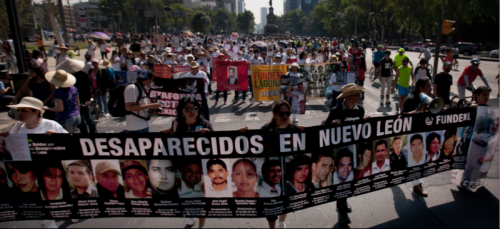
“A few weeks ago they shut down much of the town because of real safety tensions. The cartels shot down a police helicopter — no joke,” Daniel Lagespi, a student at Universidad Autonoma de Aguascalientes in Mexico, said.
Much light has been shed on the safety issues facing America — of gang violence; of police shootings; of structural, poverty driven crime. Such issues are not unique to the U.S., however, and eyewitness accounts as well as statistics would suggest that the right to basic safety is more routinely violated south of our nation’s borders.
Although drug cartel presence has existed for some time now, the “Mexican War on Drugs” escalated in full earnest as the Mexican military was placed in an active role fighting the cartels in 2006. Spanish publication El Universal reported that there are over 45,000 military personnel actively involved in the drug fight.
Official statistics place the death toll since 2006 around 60,000, although unofficial estimates from third-parties such as Amnesty International claim the toll of dead and missing people is thousands higher.
Although governments may try their best to eliminate drug trade within their borders, such governments are poorly equipped to fight the root causes of drug demand. A 2012 study from The Guardian found that the United States drives much of the global drug demand — especially with the profitable trades for marijuana and cocaine — with profits from Mexican-American trafficking routes sustaining much of the existence of cartels in Mexico.
Suzanne Carlberg-Racich, a public health professor at DePaul, described the failures of policies meant to reduce drug demand.
“There are many methods the U.S. employs to reduce drug demand, that unfortunately do not have robust scientific support behind them: namely, most drug education programs that are abstinence- based — DARE, as one example, shown to be ineffective in published meta-analyses; and the criminalization of drug use — which may have modest effectiveness in deterring flagrant or open use, but not use in general — resulting in additional harms associated with having to hide one’s use. These things do not reduce demand,” she said.
Despite a world where Latin American governments are ill-equipped to fight root causes of the drug trade, authorities continue to largely fight the issue with force. With the exception of Uruguay — which tackled part of the drug issue by legalizing marijuana in 2013 — governments have often followed directives from the United States’ policies. For instance, Mexico has received foreign aid from the United States to help build up its anti-cartel military forces.
“Much of international (drug) policy stems from U.S. opposition to legalization,” Jose Soltero, DePaul professor of sociology focusing in Latino studies, said.
Such policies have often been met with criticism as a failure to either weaken cartels, or to protect citizens from either side of the fight. Despite strong efforts to hire police and military personnel to fight cartel members, such personnel have often held inconsistent loyalties. The Latin American Herald Tribune stated that cartels pay about 1.27 billion pesos — approximately $100 million — a month in bribes to police officers.
Such issues have come into full light earlier this past year. On Sept. 26, 2014, 43 Mexican students in Southern Mexico disappeared. Many suspect they were captured by local police and delivered to local cartel syndicates to be executed, with the plan masterminded by the local mayor. “The country is trying to fight the problem with the organization of a new national police force,” Soltero said. “However, officers are often underpaid — and may come from poor rural backgrounds — making it easy for cartels to recruit.”
With governments south of the border struggling to fight cartels — and the United States remaining adamant about its drug- fighting stance — it remains to be seen if any new and functional solutions will be able to address the safety crisis.
“Safety situations and rights are bad up north (in America),” Lagespi said. “However, cops aren’t actively collaborating with gangs, unlike here. Some trips on the highway, we might be afraid of getting pulled over — by either side — and not returning.”

